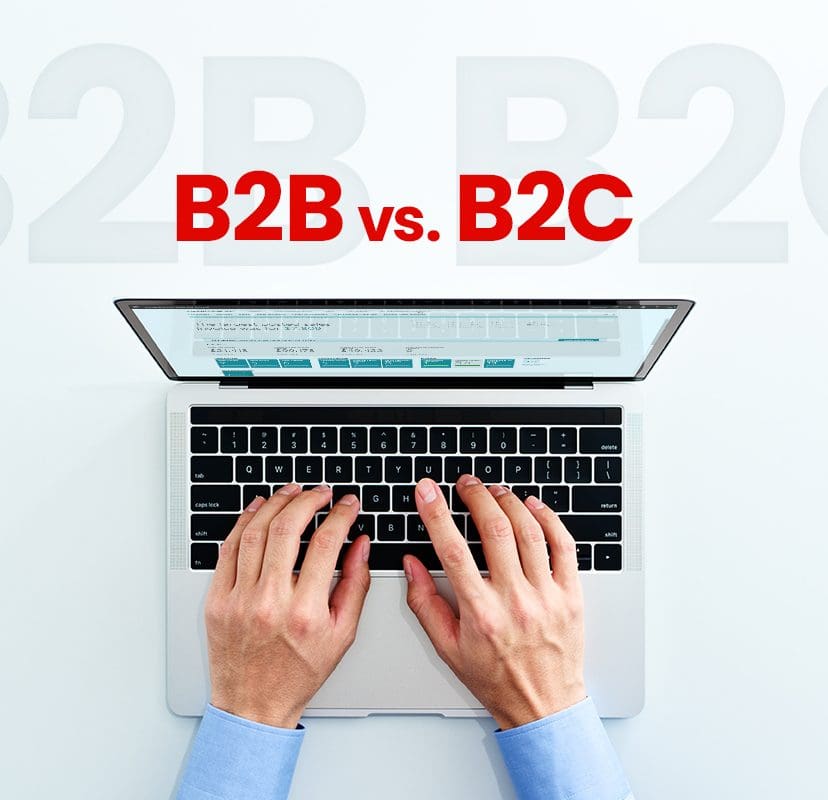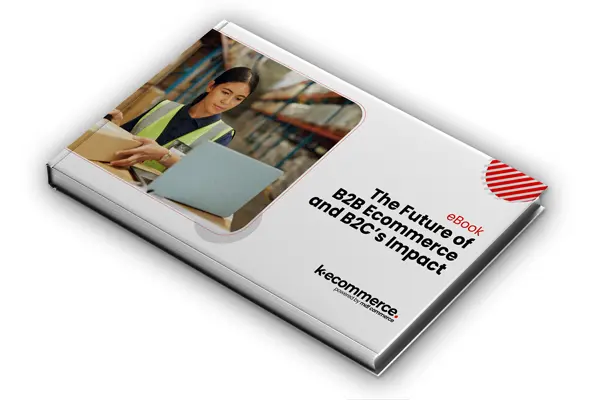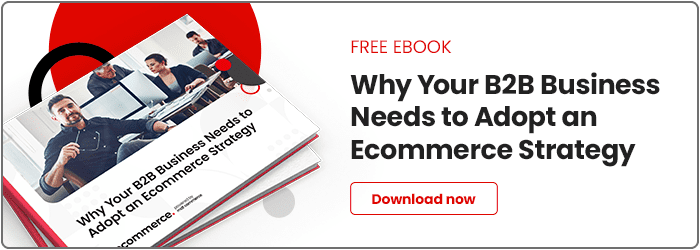
B2B vs. B2C Ecommerce: What to Know Before Optimizing Your B2B Site

Marketing Team
k-ecommerce

Ecommerce is getting more competitive by the day.
And creating a frictionless and effortless buying experience is critical to staying competitive. B2B buyers don’t make impulse purchases the way B2C customers do. B2B sellers need an ecommerce platform with features and capabilities that meet their unique requirements and needs.
Ecommerce platforms today typically fall into two categories:
- Ecommerce platforms designed for B2B transactions.
- Ecommerce platforms designed for B2C but adapted for B2B use.
How do you figure out the right ecommerce solution for your B2B business? You tailor it to your unique business needs, and understand how they differ from a B2C use case.
What are the Differences Between B2B and B2C in Ecommerce?
What are B2B and B2C in ecommerce? B2B vs. B2C ecommerce comes down to target customers. B2B (business-to-business) ecommerce refers to online sales between two businesses, and B2C (business-to-consumer) ecommerce focuses on selling goods and services to individual consumers.
While some businesses are solely B2B companies or solely B2C companies, some are both, with products that have both individual customers and business clients.
B2B ecommerce transaction examples include:
- A software company selling CRM systems to a sales agency.
- An office products wholesaler selling office supplies to an accounting firm.
- A textile wholesaler selling fabrics to a clothing manufacturer.
B2C ecommerce transaction examples include:
- A basketball enthusiast buying a pair of shoes.
- Someone buying a monthly subscription from Netflix.
- A student buying a smartphone from Amazon.
In summary, they are fundamentally different business models with buyers that have complex needs and unique expectations.
Meeting the Needs of B2B vs. B2C Ecommerce Buyers Starts With Understanding Them
B2B ecommerce and B2C ecommerce have similarities, but B2B ecommerce demands a more highly personalized user experience.
The personalization at scale that B2B buyers expect and demand requires leveraging customer data and tailoring your messaging and offerings for specific segments of your B2B audience. To develop that targeted approach, here are eight factors that will shed more light on how to best sell to your ideal customers.
Knowing Your Target Audience
 B2B products or services target a group of individuals representing a business or organization, ranging from executives to key stakeholders.
B2B products or services target a group of individuals representing a business or organization, ranging from executives to key stakeholders.
B2B buying groups make purchasing decisions based on logic. An individual can’t impulse buy when other stakeholders are involved in decision-making.
B2B buyers make purchase decisions based on past interactions, reputation, pricing, and the ability to deliver seamless buying experiences.
Most often, B2B suppliers that use customer data to implement personalization in their B2B marketing strategies get the sale and repeat business.
With B2C ecommerce, customers tend to buy based on emotional connections or fear of missing out, so hype and flash are usually enough to get a sale.
Understanding the Buying Process
The B2B buying process is longer than B2C because B2B transactions often involve large purchases that are significant investments. So B2B purchases often require multiple levels of approval, contract negotiations, and, sometimes, formal proposals.
Given the long-term nature of B2B relationships, every purchase decision carries substantial weight. B2B sales require getting every transaction right, from the initial engagement to customer support.
With B2C ecommerce, the buying process involves less money, fewer decision-makers, and is fast and straightforward on simple storefronts.
Consider the Products and Services at Hand
Each B2B customer has its own requirements, goals, and constraints. To meet unique pain points and needs, B2B companies must have the customization capabilities to offer tailored products and services for each customer.
B2B ecommerce businesses need a detailed and informative approach to presenting products and services to make the sale. You must provide thorough product information, offer extensive support resources, and ensure your sales team can expertly guide customers through the decision-making process.
Pricing
 Business buyers look for a pricing model to fit their unique needs and requirements. To meet these expectations, B2B merchants must offer customized pricing models such as volume discounts, contract-based pricing, or bespoke pricing structures tailored to individual businesses. Critical among these customized experiences is per-customer pricing. Today, only 57% of vendors offer it.
Business buyers look for a pricing model to fit their unique needs and requirements. To meet these expectations, B2B merchants must offer customized pricing models such as volume discounts, contract-based pricing, or bespoke pricing structures tailored to individual businesses. Critical among these customized experiences is per-customer pricing. Today, only 57% of vendors offer it.
This highlights the crucial role of robust and flexible ecommerce solutions in streamlining and enhancing the pricing process for B2B businesses.
Customer Experience
Both B2B and B2C ecommerce share the common goal of delivering a positive customer experience, but they require different approaches.
B2B ecommerce focuses on customization, relationship building, and addressing complex business needs, whereas B2C ecommerce emphasizes convenience and speed.
With complex B2B transactions, the expectations of business customers are evolving fast. In fact, 81% expect suppliers to make functional updates to their ecommerce website multiple times a year.
B2B businesses must invest in a highly-adaptable and user-friendly ecommerce platform with ERP integration that makes it easier for business buyers to do business with you. In addition to personalized product recommendations and streamlined order tracking fulfillment, B2B businesses must provide efficient self-service options that benefit both the buyer and seller.
B2B customers are often repeat buyers, and an ecommerce platform that offers self-service features operating 24/7 is crucial for customer convenience when reordering. After all, virtually all B2B buyers prefer to self-serve than to speak with a salesperson when making a purchase.
Payment
B2B companies must offer a broader range of payment options and dynamic payment terms to cater to the more specialized needs and requirements of B2B customers.
B2B transactions typically involve large order volumes and repeat purchases. With high transaction amounts involved, B2B suppliers often offer credit terms so business customers can manage their cash flow better.
With complex payment requirements from business customers, B2B sellers must meet them halfway by making it easier for them to track their expenditures via purchase orders and a streamlined invoicing process.
And to give B2B customers more good reasons to pay bills online, B2B sellers must give them more secure payment platforms.
Catalog Management
B2B businesses need to offer larger and more detailed custom product catalogs to cater to their customer base’s specific needs and requirements.
Bulk pricing, tiered pricing, and a custom catalog of products directly targeted to a specific customer help B2B businesses streamline transactions and meet the diverse needs of business customers.
B2B vs. B2C Ecommerce: How To Differentiate Between the Platforms
It’s important to understand the three key primary differences between B2B and B2C ecommerce platforms to identify which is best for your company.
Integration
 B2B ecommerce websites demand more extensive integration capabilities to address the unique requirements of business buyers.
B2B ecommerce websites demand more extensive integration capabilities to address the unique requirements of business buyers.
These integrations may include ERP systems, CRM software, and other critical business tools to streamline operations, deliver real-time data, and enhance overall efficiency.
By seamlessly integrating with these systems, B2B platforms can facilitate smooth order management, inventory tracking, and personalized customer experiences.
On the other hand, B2C ecommerce websites might need less comprehensive integration, focusing more on user-friendly interfaces and hassle-free payment processing.
Customization
B2B ecommerce platforms offer a high level of customization to cater to their clients’ diverse and specific requirements.
This includes the ability to create tailored product offerings, pricing structures, and approval workflows.
B2C platforms, on the other hand, typically prioritize simplicity and ease of use for end consumers, with less emphasis on customization.
Features
Given the complex nature of B2B transactions, it’s not surprising that B2B ecommerce features differ from B2C ecommerce features pretty drastically.
B2B ecommerce platforms often incorporate advanced functionality to tackle the complexities of B2B transactions, including customer-specific pricing, real-time inventory tracking, and customized payment arrangements.
Some also offer catalog management, enhanced customer relationship management, and a robust checkout process. All that and more to ensure your B2B business maintains strong, lasting relationships with your valued partners.
The Role of ERP Integration in B2B Ecommerce Success
B2B businesses depend on their ERP systems. These platforms serve as the nervous system of their operations, handling everything pertaining to inventory, contracts, customer data, and accounting. This is a treasure trove of information that can and should be integrated into your B2B ecommerce workflow to ensure efficiency and success.
If your business still relies on manual workflows for processing orders, things can become disjointed rather quickly and lead to serious problems. Without ERP integration, filling in data manually creates bottlenecks due to delayed orders, inaccurate stock counts, and misapplied pricing. Having everything connected to your ERP system, on the other hand, means all the necessary information is filled in automatically and updated across all areas of your operations. It’s no longer acceptable to have your B2B ecommerce platform siloed away from your ERP — it has to serve as an extension of it.
When B2C Ecommerce Strategies Backfire in B2B
It would be a big mistake to assume that the same approach that works with general consumers online would work when selling to businesses. Unfortunately, far too many companies try to set up their B2B ecommerce sites using B2C platforms retrofitted to serve business customers. This ends up doing far more harm than good and may even be worse than not having a B2B ecommerce platform at all.
This is because B2C platforms simply aren’t equipped to handle the unique needs of business customers. Typically, they don’t feature built-in support for quotes, role-based access, or complex pricing. You’ll most likely need to spend tedious hours customizing your software and finding workarounds to provide immediate solutions. On top of the time and resources you’ll have to burn just in hammering the platform into shape, you’ll also encounter significant hang-ups as you and your customers attempt to use it. Among the most common issues companies run into when trying to substitute a B2C platform for B2B ecommerce are higher support volume, order errors, manual data re-entry, and disconnected order tracking. These problems only get worse as your company grows, which is why it’s best to commit to a B2B-specific platform that’s designed from the ground up to handle these complexities at scale.
Can One Ecommerce Platform Serve Both B2B and B2C?
Given the wide gulf between the needs of consumers and the needs of business, it might sound as if there’s no way to close it. However, a growing number of companies are serving end consumers and business clients from the same digital storefront. This means hybrid ecommerce platforms are gaining in popularity. These are built differently from a B2B-only or B2C-only platform because they have to meet a unique set of operational challenges. For example, they need to be capable of maintaining separate product catalogs for each market, as well as distinct pricing tiers and workflows.
To be able to serve both types of customers, these hybrid ecommerce platforms must feature ERP integration, along with dynamic segmentation, a highly configurable UX, and permission-based content visibility. Built with all these features and more, k-ecommerce offers an elegant solution to this hybrid approach to ecommerce. It eliminates unnecessary duplication caused by operating two distinct platforms and enables your growth across multiple revenue channels.
How to Audit Your Current Ecommerce Setup
Are you sure your B2B ecommerce solution is doing everything it should for you and your customers? How can you tell? What are some of the most common red flags that mean it’s time to consider an upgrade? To find the answers to these questions, it’s important to conduct an assessment of your ecommerce setup. This will be crucial in helping you understand how your platform provides the right technical fit, customer experience, and operational efficiency for your business. When conducting this self-assessment, be sure to follow this checklist:
- Does your platform support per-customer pricing and catalogs?
- Will it integrate with your existing ERP and CRM software?
- How does it perform in terms of order accuracy and fulfillment speed?
- Do buyers have access to easy reordering and other self-service features
- Do your admins spend most of their time manually entering data?
If you’re noticing the same friction points coming up frequently for your internal teams and customers, it’s probably time to explore an alternative. With powerful integrations and extensive features, k-ecommerce offers a compelling case for being your all-in-one B2B ecommerce platform.
Optimize Your Ecommerce Solution With k-ecommerce
B2B buyers have heard all of the old sales pitches. They want more: streamlined processes, personalized experiences, and customer-facing platforms that make their lives easier. You can’t settle for a basic online store to win B2B business. Along with a strong B2B ecommerce strategy, you need a B2B ecommerce solution that’s designed specifically for a B2B business like yours. You also need to be sure that whatever ecommerce platform you choose will be able to scale up with you as your company grows. That means more than just being able to handle more traffic or order volume, but also in terms of feature flexibility, integration extensibility, and support for your expanding operational complexity. You also need to be sure that whatever ecommerce platform you choose will be able to scale up with you as your company grows. That means more than just being able to handle more traffic or order volume, but also in terms of feature flexibility, integration extensibility, and support for your expanding operational complexity.
At k-ecommerce, we offer k.ecom, an ERP-integrated ecommerce solution to help you build an online store that best serves B2B (and even D2C) ecommerce. With our platform integrated into your operations, you can forget about creating customized workaround code, experiencing system lag under volume, dealing with siloed data, or rising support costs. Our solution is built to serve you now and well into the future, so you can avoid the headaches of adapting to a new platform down the road.
And before making a decision, be sure to review the five essential factors for choosing a B2B ecommerce platform.






